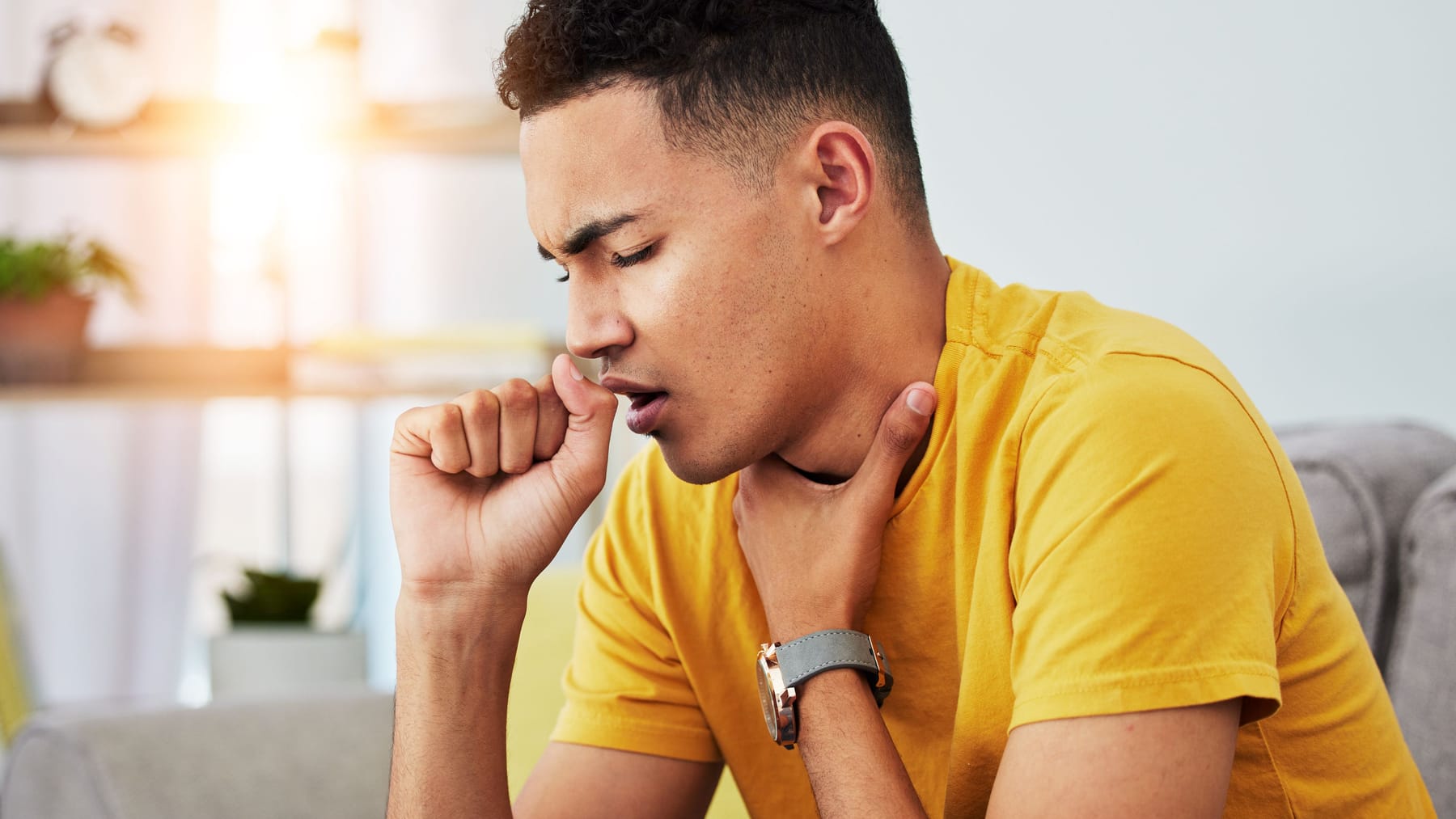Coughing after eating can be harmless. But it can also indicate a disease, especially if it occurs frequently. What are the possible causes?
The most important things at a glance
An occasional cough during or after eating is usually not a cause for concern. However, if you continue to cough after eating, you must get to the real reason behind it. Because various diseases can be hidden behind them.
Possible causes of coughing after eating include:
- Stomach acid reflux (reflux)
- Swallowing disorders, for example after a stroke or esophageal disease
- Allergic reaction
Choking, for example due to eating too quickly, can also cause sudden coughing when eating.
Some possible causes will be presented in more detail in the following chapters.
important note
Coughing after eating can have many causes. Only a few important motivators can be mentioned in this article. It is important to always have a persistent cough checked by a doctor. If there are severe accompanying symptoms such as shortness of breath, swelling of the throat or chest pain, those affected should, if in doubt, alert emergency services immediately (112) – because there may be a serious reason behind this.
Coughing after eating due to reflux
A cough that occurs some time after eating could be caused by reflux disease. Gastric juice always ends up somewhere it doesn't really belong: in the esophagus. But it can also reach the windpipe and cause coughing and the urge to cough.
Normally, the sphincter located at the junction between the esophagus and the stomach ensures that food mixed with gastric juices does not flow into the esophagus. The fact that this happens every now and then after a large meal is nothing to worry about.
It only becomes a problem when the closing mechanism between the esophagus and stomach is persistently weak. Then the stomach contents can repeatedly reach the esophagus. Experts talk about reflux (reflux). Over time, reflux can lead to symptoms known as gastroesophageal reflux disease (abbreviation: GERD).
Typical symptoms of reflux include heartburn or frequent burping. But it can also include coughing that occurs after eating or at night. Other possible symptoms include a feeling of fullness, a burning sensation in the throat, an unpleasant taste in the mouth and difficulty swallowing.
Coughing after eating is caused by reflux when aggressive stomach juice flows into the trachea and causes irritation there (laryngeal pharyngeal reflux). You can learn more about reflux disease here.
Coughing after eating due to difficulty swallowing
Experts call the accidental inhalation of substances, which sometimes occurs in healthy people when they are swallowed during a meal, as aspiration.
During suction, solids or liquids enter the respiratory tract. These include, for example, foods, drinks, saliva or stomach acid.
There is an increased risk of aspiration after eating if there is a swallowing disorder. Swallowing disorders (dysphagia) can have very different causes, such as:
- Neurological diseases such as stroke, dementia, multiple sclerosis, and Parkinson's disease
- Cancer of the mouth, throat or esophagus
- Diseases in the esophageal area, such as pathological protrusions (diverticula) or disturbances of rhythmic contractions of the esophagus
- Muscle diseases, such as muscular dystrophy or the autoimmune disease myasthenia gravis
- Injuries
- Deformities
The risk of developing a swallowing disorder increases with age.
Paroxysmal coughing while eating can indicate a swallowing disorder. The person may also choke frequently. Other possible symptoms – depending on the type of disorder – include frequent clearing of the throat, food getting into the nose or mouth, or a wet, ringing, bubbling or gurgling sound.
If certain foods or drinks get into the lungs due to a swallowing disorder, pneumonia can occur. Experts talk about aspiration pneumonia. Bedridden and/or elderly people are particularly affected.
Cough after eating due to food allergy
Discomfort that occurs within a few minutes to hours of eating may be a sign of a food allergy. The immune system reacts to some harmless proteins in the body. Common triggers include nuts, chicken eggs, cow's milk, soybeans, stone fruits, carrots, as well as fish or meat.
Food allergies are especially common in the mouth, throat and on the skin. Those affected suffer, for example, from itching, swelling or a rash. Digestive problems such as nausea, diarrhea, or vomiting are also common.
But a cough that occurs some time after eating can also indicate an allergic reaction, as can hoarseness or wheezing.
important note
If there are severe symptoms or signs of anaphylactic shock — such as severe swelling, shortness of breath, or burning in the hands and feet — those affected should not hesitate and alert emergency services (112).
Allergy testing can provide confirmation whether coughing after eating is indeed caused by a food allergy. You can read how it works here.
Coughing after eating: Choking can become an emergency
Everyone is familiar with the accidental choking while eating: where a little food or liquid accidentally enters the respiratory tract. In most cases, a strong cough causes food to expel from the windpipe.
If it doesn't, it's an emergency – for example, if a piece of bone or fish bone gets stuck in the windpipe (or esophagus). The person can then suffocate. Such an emergency can be recognized by a persistent cough and shortness of breath with wheezing. The face may turn red or blue.

“Total coffee aficionado. Travel buff. Music ninja. Bacon nerd. Beeraholic.”








More Stories
Coral Seeding: Artificial Insemination Makes Coral More Heat Tolerant
Fear, Anger, and Denial: How People Respond to Climate Change – Research
LKH Graz: Using radiation to combat heart arrhythmias